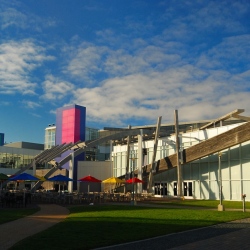
Six years ago this month, Google moved into one of the largest buildings in New York City. Google had only been public for two years and its stock price was soaring. By 2006, speculation was running rampant about Google’s ultimate goals. In addition to building the world’s largest Internet search engine, Google was furiously buying up so-called “dark fiber,” the unused long-haul underground cable left dormant by the dot-com crash.
When Google moved into 111 Eighth Avenue, the former Port Authority building, New York took notice because that giant facility is one of the most important “telecom carrier hotels” on the East Coast. A “telecom carrier hotel” or colocation center, is a major physical network node that allows tech and telecom firms to share space in proximity to improve network service and speed. There are just a few dozen in the U.S. (Here’s one in Los Angeles.) As it happens, 111 Eighth Ave. sits directly on top of the point where the critical Hudson Street/Ninth Avenue fiber highway turns right, before heading north-east toward the Upper West Side. In New York City, fiber-optic cables are bundled together in large clusters that snake underneath the sidewalk.
So why was Google buying up all that “dark fiber” and situating itself on top of key points in the nation’s telecommunications grid? Did the still-young technology juggernaut have designs on becoming an actual internet service provider? (Ultimately, Google bought 111 Eighth Ave. for $2 billion.)
On Thursday, six years later, we got our answer. And it’s still no. Google’s goal, by building the fastest city-wide broadband network in the country, is not to compete with the giant national cable and telecom firms. Rather, it’s to shame these legacy giants, including Comcast, Time Warner Cable, Verizon, AT&T, and others into improving U.S. Internet performance. Why is that important to Google? Because the more people who use broadband Internet, at faster speeds, the more Google searches get executed, and the more money Google makes. So think of Google Fiber as a kind of proof-of-concept public-shaming that Google is performing in the heartland of America, demonstrating to the country — and the world — that better Internet performance is possible.
